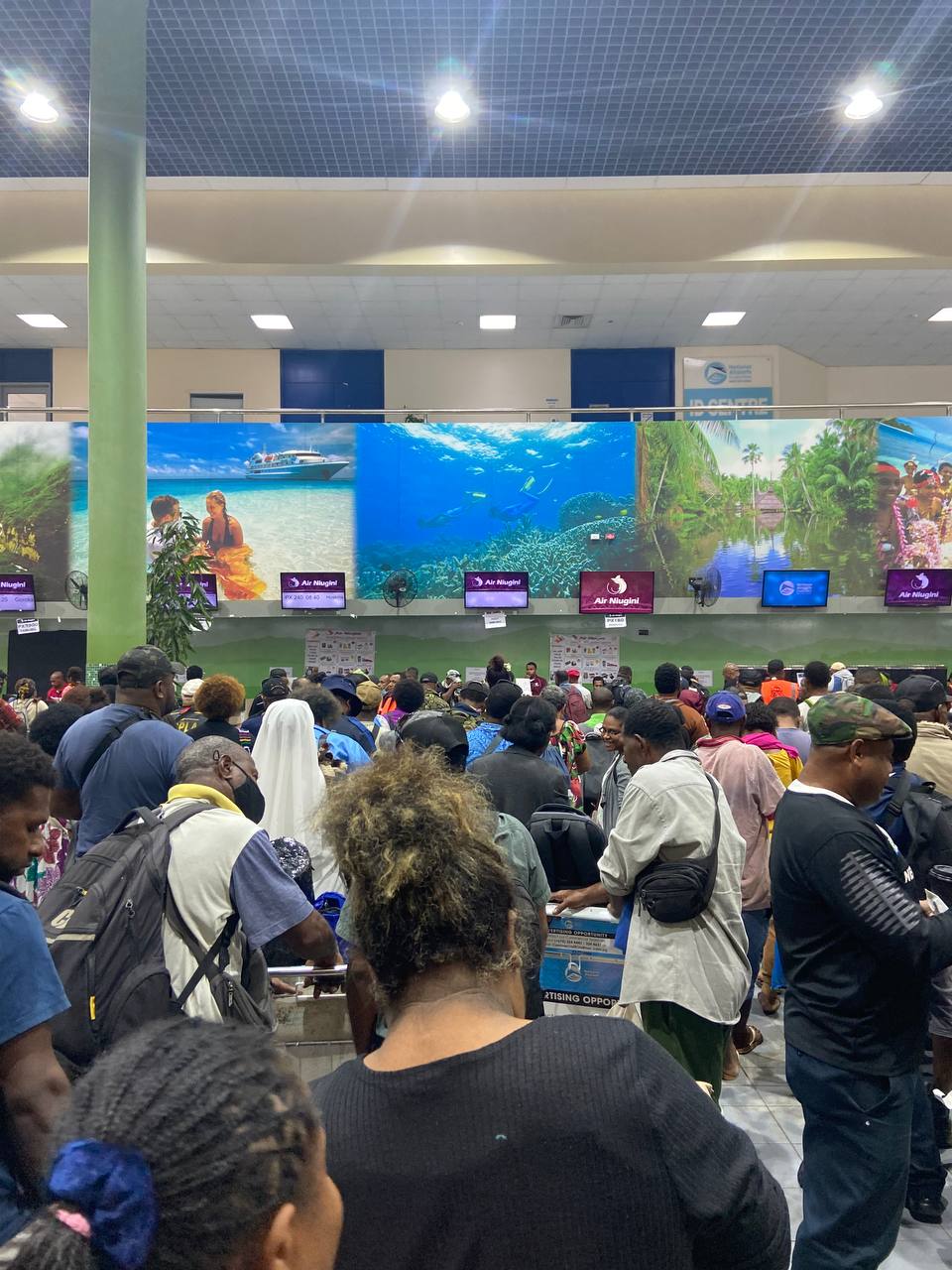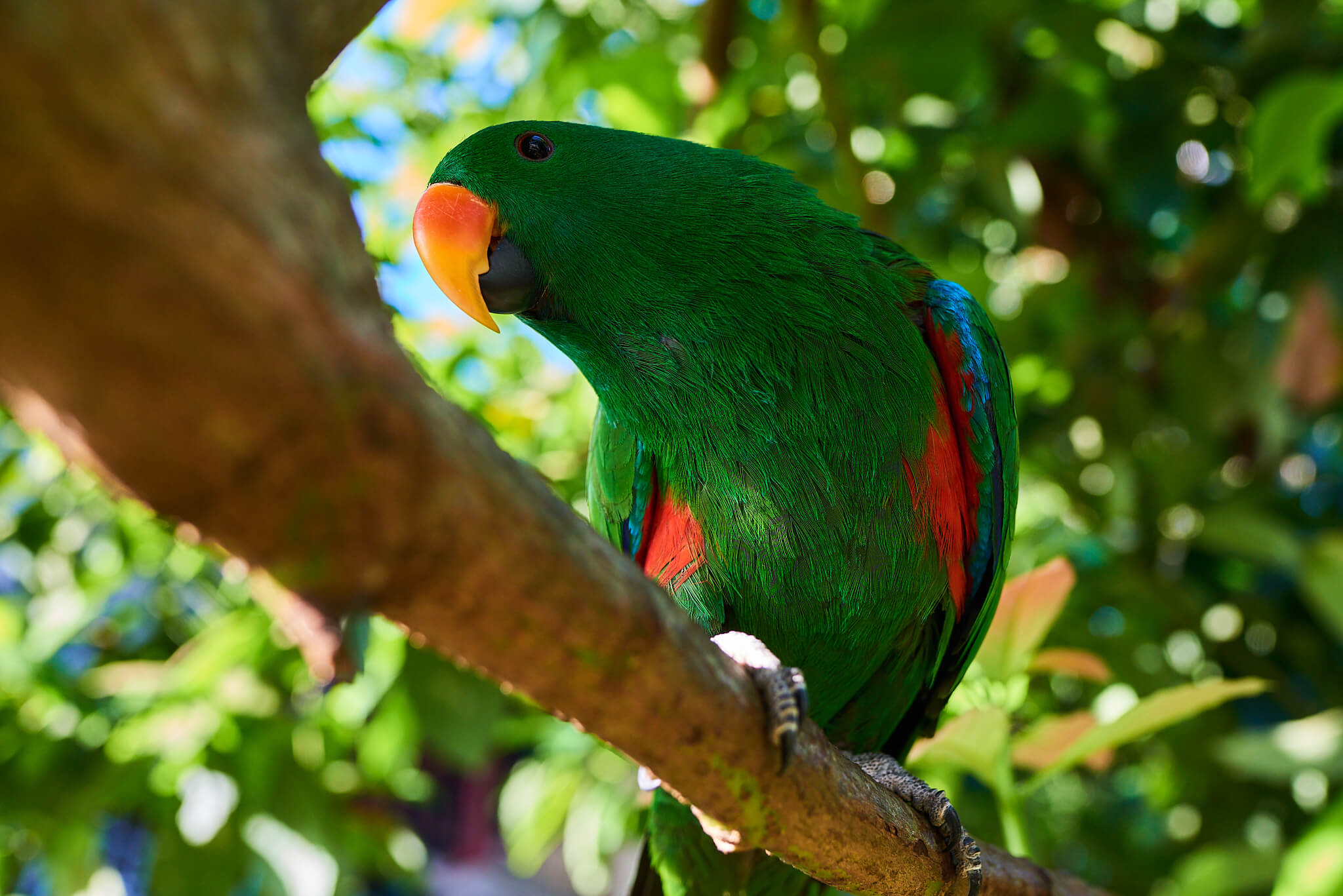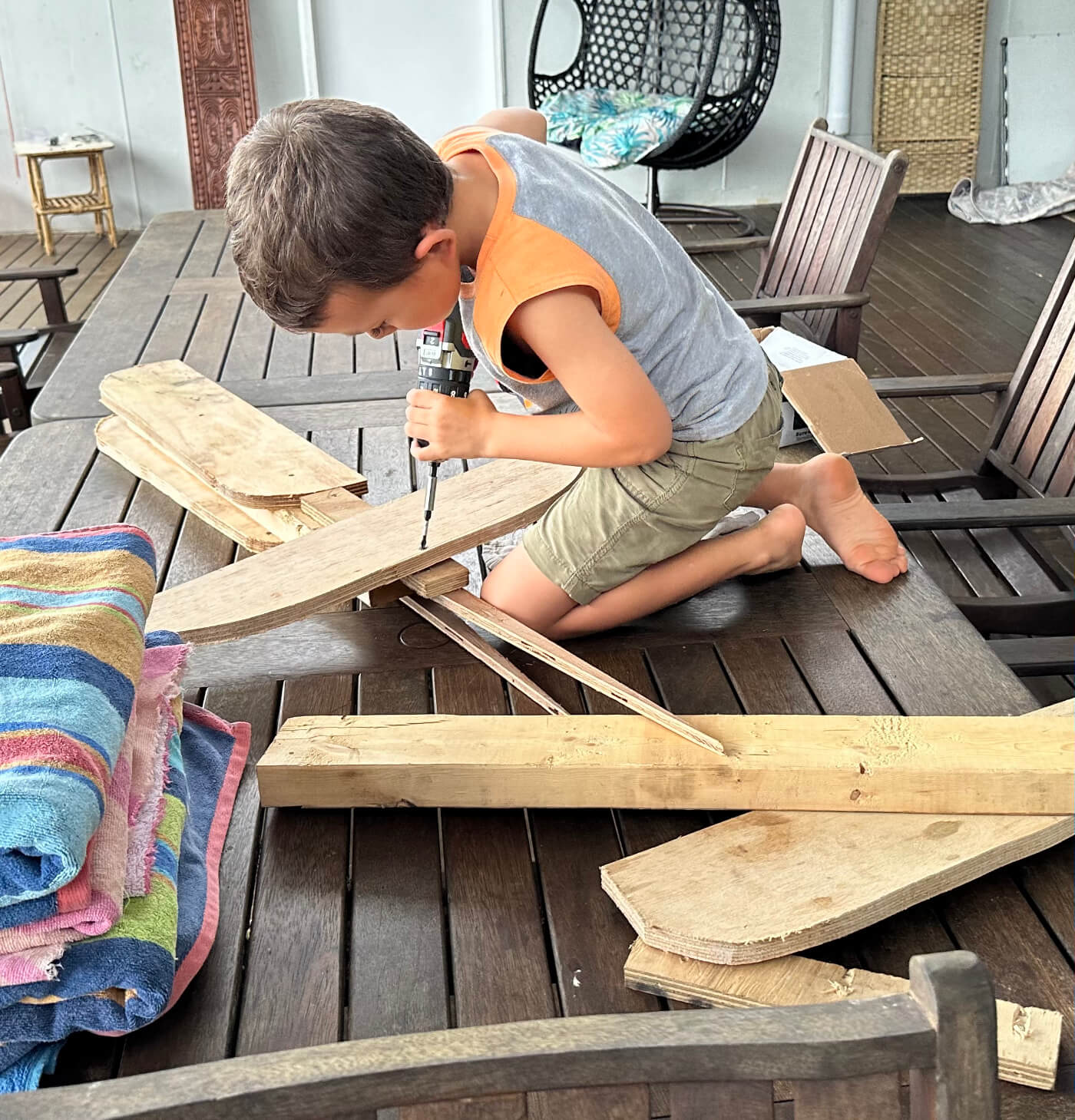We’ve been in Papua New Guinea six months now. It’s amazing how fast the days go by here and I can’t believe it’s the middle of October already. I’ve never seen the world spin so quickly before. It’s like I’m riding a merry-go-round and my feet are flapping straight out like a cheap flag in a bad tempered storm. Still, it’s not much tougher than we knew it would be and we’re not more stressed than we expected. So, as the dust settles and space begins to clear in our brains again, we are feeling a little more like ourselves. We’re no longer spending our days crying with our head in our laps wondering what we’ve done.
Elliot has been adjusting to life in Papua New Guinea. When we first arrived, he was deathly scared of getting water in his face. Admittedly the water is salty and it stings your eyes a little. But still it was a little embarrassing having my child scream like an Aztec death whistle every time his nose approached water. My frequent and fervent advice to, “Take it like a man” did little to fix the problem. ” Janice tells me to calm down. “He’s just like you,” Janice says, but I’m not sure why she’d bring that up while my child is complaining bitterly about something trivial.
Fast forward six months and we were at the beach. Windy season is starting and with it, bigger waves at the beach. Elliot was jumping around the surf when he was suddenly struck by a rogue wave. He disappeared under the water for a bit but soon a soggy little boy washed up on shore among the uprooted seaweed and coconut husks. After coughing a little he put his thumb up and said, “I’m good!” and ran back to the ocean. I suddenly realized how much we’ve adjusted without knowing it.

Still, something that’s hard to adjust to is the lack of seasons. You know how summer always goes way faster than winter? Well it’s always summer here so time never slows down. It’s weird seeing our friends in the states post pictures on social media wearing hoodies and blankets and stuff. It’s weird because it’s 8:30 am here and I’m already sweating. Mornings are typically cooler and humid but around 7 am the sun pokes its head up from behind the soccer field across the street, laughs maniacally, and aims its death ray on the front windows of our house.
Because of the sun’s death rays we’ve been spending a lot of time at the ocean.

When you live on an island, you’ll find ocean everywhere. You’ll also find that not all ocean is equal. Some ocean is just sharp rocks pounded by angry waves (not a good place to go swimming) while some ocean is just ribbons of white sand nuzzled by the lazy ebbs and flows of the tide (this is good for swimming). One of our favorite spots is Wom Beach, which is a 15 minute drive from our house.

On our way there we drive past Cape Wom Memorial Park, marking the location where Japanese Lieutenant General Hatazo Apache surrendered to Australian Major General Robertson on September 13, 1945 and ended World War II in the Pacific Theater.

Of course, the kids don’t care about that, all they care about is the beach! The beach is privately owned and the lady who owns it (a women landlord is called a mamagraun) makes her living by charging a small fee per carload of visitors. She keeps her beach (and business) thriving by spending her days walking up and down the beach with a rake removing bottles and dead branches and things like that. She has the uncanny ability to show up at the beach to collect her fee fifteen minutes after you park the car, no matter how quietly you drive in. It’s not that she doesn’t deserve it. In fact, one time she pretty much saved the life of one of our friends.
You see, the amazing thing about this beach is that there’s a shallow reef about 100 yards from shore meaning you don’t need a boat or scuba gear to see it – just a mask and snorkel! And sometimes you don’t even need that. At low tide you can literally walk up to the reef and just look down at sea urchins, jelly fish, and other unidentified species you probably shouldn’t touch. It’s like walking up to a rich man’s aquarium and just looking in, except here you’re looking at God’s aquarium and it’s a lot better.
One particular day, we had brought a local family from our church with us to Wom beach because, well, the locals like the beach too and we like this particular set of locals, so it made sense.
Janice’s favorite activity to do at the beach is to find sea shells. I find it mildly therapeutic as well, but Janice even more so. It is more fun than putting puzzles together, which is her other therapy. Come to think of it, maybe she enjoys things that her husband and children do not just because she gets left alone while she does them. Anyway, Janice was collecting shells and Kenneth, the ten year old son of the family we brought along, was out swimming around the reef looking for some as well. He saw something black in the sand and thought it was a shell so he reached down to grab it. Suddenly a spiny fin shot out of the sand and stabbed Kenneth in the thumb, then made a hasty retreat into deeper waters. Kenneth made a hasty retreat back to shore.
I didn’t see it happen but I soon found Kenneth sitting at the table crying while his mother sat there looking fairly sympathetic. Now, this is a good time to say that I rarely see older PNG children cry. Papua New Guineans are as tough as nails because, as far as I understand it, it’s a sign of weakness in the culture to admit your in pain. We’ll medivac men with spears stuck in them and they don’t even whimper. A women quietly gave birth to twins sitting in the backseat of our airplane and then climbed out of the plane at the airport without much assistance. We even had a guy who just had his arm chopped off walk himself out of the plane while giving orders to those around him, waving his heavily bandaged nub around emphatically. He probably could have run a marathon and and beat my time. So to see a ten year old crying, well, I was curious what happened.
“He got stung by something in the sand,” She said.
“Oh.” I said. I thought for a little. “What was it?”
“We don’t know. A fish or something.”
I thought for a little more. Should I be concerned? Do fish even sting people? Maybe this was just like a bee sting? Should we just give him an apple to chew on so he stops moaning until the pain wears off? Or is this some poison that’s slowly killing him while we stand around twiddling our thumbs?
No one else seemed too concerned. Still, I’ve seen plenty of Papua New Guineans in crisis and they never seem concerned until people die, of course, then it’s traditional to wail loudly. So by the time you hear them wailing, it’s too late. Maybe I should do something before the wailing starts?
He was clearly in a lot of pain and the pain was getting worse, along with his objections to it. I could tell he was in agony. The only medical training I’ve received was my mother telling me that, “an ounce of prevention is worth a pound of cure.” Along those same lines I was taught in scuba diving class ten years ago that “If you don’t know what it is, don’t touch it.” But no one ever told me what to do if you did decide to touch it and suddenly needed a pound of cure.
Suddenly my brain butler coughed politely to get my attention and then handed me a memory of someone telling me that if you pee on a jelly fish sting, it will relieve the pain. My brain butler has poor handwriting so it was hard to read, but I think the person who told me that was Australian, and that’s a jelly-fish-sort-of-place so they probably know what they were talking about. Still, I wasn’t about to pee on an injured child because of some Australian folklore. Our friendship with this family was just beginning and doing something like that could bring it to a screeching end. Even if I had reams of scientific research in front of me telling me it worked, I’d be tempted to let the kid suffer. Suffering builds character, after all.
As I was wrestling with what to do, the mamagraun showed up, quietly shuffling down the beach with her rake looking for beachgoers who hadn’t paid their fee. She heard the story and said to go to the hospital right away since Kenneth was stung by what I thought she called a “Two Kina Fish.” She said the bad blood will travel up his arm to his heart and then he’ll die. Of course, I wanted to trust but also verify so I turned to my English speaking friend who was with me; Google. Now “Kina” is what they call their dollar here, which didn’t make sense to me. Why would they name a fish after currency? It didn’t make sense to Google either. At the same time, Kenneth’s dad, who drove separately to finish up some errands, arrived, expecting to spend some relaxing time on the beach. Instead he was handed his crying son who’s prominent feature was his throbbing purple thumb which was getting bigger and more purple by the minute.
They rushed off to the haus sik and left our family relaxing on the beach which felt a little cruel and unfair, but neither did it make sense to go with them.
Kenneth received two shots of painkiller and a shot of antivenom. He was stung by what the rest of the world calls a Stone Fish, which is the most venomous fish in the world. But the beach lady wasn’t too far off. I’ve come to learn that I was googling the wrong currency. Papua New Guinea has Kina (similar to dollars) and Toea (pronounced toy-a and it’s similar to cents). And guess what used to be pictured on the two toea coin? The Lion Fish, which has similar poison (and the same type of anti-dote) as a Stone Fish. A sign of envenomation is purple, swollen skin. The venom travels through the bloodstream to the heart where it can cause cardiac arrest, seizures, or paralysis. especially in younger children. In Tok Pisin it’s not uncommon to use one word for several different things, which makes it very confusing. So I’m willing to bet that a Two Toea Fish covers several different species.

I saw Kenneth the next day and he was running around in fine spirits, showing people his thumb which had a little hole in it.
Later I learned that hot water, as hot as you can stand, can be helpful in destroying certain kinds of venom (like that of the stone fish) and relieving pain, almost instantly in some cases. So, don’t embarrass yourself by peeing on people. Instead put a pot of water on boil, wait until it cools down just cool enough so you can put your finger in it without scalding yourself, and then soak the puncture area. You should probably seek medical attention as well, just in case.
The beach lady earned her fee that day.





Leave a Reply